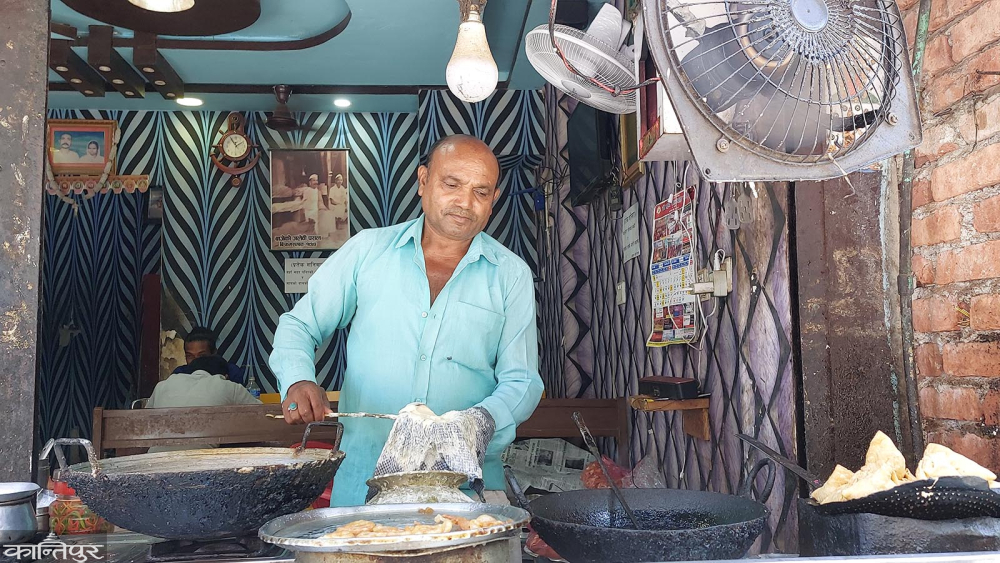Not to eat 'Bajeko Jalebi'?

We use Google Cloud Translation Services. Google requires we provide the following disclaimer relating to use of this service:
This service may contain translations powered by Google. Google disclaims all warranties related to the translations, expressed or implied, including any warranties of accuracy, reliability, and any implied warranties of merchantability, fitness for a particular purpose, and noninfringement.

Highlights
- A 106 year old Jalebi shop



There is nothing much like glitter and decoration. At first glance, this shop that has to be passed through the street looks like an ordinary one. In Butwal-1, known as Old Batauli, is a 160-year-old Jalebi shop. Where there is a rush of customers from early morning.

Customers come from Butwal and nearby areas to buy Jalebi (Jerry). The fact that the shop is centuries old can be seen from the pictures hanging on the wall. In the picture, the founder of the shop Sitaram Haluwai, his son Laddulal and grandson Kiran are seen together . Now the two people in the picture are gone . 57-year-old Kiran is running the same jalebi shop that Baje has been running since 1975. The business started by Baje is being handled not only by grandson Kiran, but also by grandson. Since Baje started it, Kiran named the shop in memory of Sitaram, Baje's Jalebi Shop .
Kiran started helping his grandfather and father in the business in Batauli from the age of 15. He used to study in a school near home. During tiffin break, Kiran used to take jalebis and samosas to school and sell them. "We used to give 3 pieces of jalebi for 5 rupees," said Kiran, "now it costs up to 25 rupees per piece."
Kiran's family was big. Grandfathers two brothers . From grandfather to son, daughter-in-law, grandson all lived in a joint family. 45 years ago, after the separation of 2 brothers and grandparents, the house was also split in half. Younger grandfather's son, grandson is running the same business in his home . Across from Kiran's shop, his uncle Gaya Prasad Haluwai is also running a jalebi and sweets shop. His grandfather passed away when he was 16 years old. The business came under the responsibility of the father. Kiran also dropped out. 'The situation at home was not so good,' he said, 'I, the eldest of the four brothers, took it upon myself to help my father.' 
He grew up listening to the praises of the locals, leaders and businessmen who came to eat Jalebi cooked by his father and decided that he should learn to cook the same way. ; After getting married at the age of 20, another layer of responsibility was added to her . Kiran started selling jalebi helping his father. After her father passed away in 2057, Kiran was given the responsibility of taking over the business and running the household. He is continuing the same business . Locals of Butwal are his regular customers, now knowing that it is an old shop, there are also those who come, taste jalebi and take parcels.
Until the arrival of the local government, Jalebi, which was only cooked by Kiran, has become a must-taste item for government employees, public representatives and every guest who comes to Butwal. The door of his shop opens at 5 in the morning. The morning walkers come saying to cook tea . Until 20 years ago, tea was not brewed in Kiran's shop. People coming to buy salt from Palpa used to eat jalebi from his shop and go to Khasyauli market. He only sold jalebis, sweetmeats and samosas . However, when the demand for Jalebi started, he also started making tea. "There are customers who only drink tea till 6 o'clock," he said. "If there is an order, we make it separately and send it accordingly," he said.
They prepare the required mud for Jalebi in pots from the olden days . There the old dadu puts the maad in a cloth and spins the jalebi . He said that those old dishes also add energy to the business because they give a glimpse of their ancestors. Until a few years ago, it was a custom to take parcels to Dunatpari and give them to those who eat them in the shop. ``Farmers from Nuwakot used to bring leaves,'' he said, ``I used to burn firewood and cook, but now I have gas, I started keeping plates.'' They have 4 sons and a daughter. All are found in the store . Some prepare potatoes for samosas, some make jalebi maad . Jalebi is delivered to the customer . All children are playing an equal role in going to buy goods and helping their father. Kiran could not teach his 3 sons much . "It's luck, they tried several times, but their sons couldn't," he said, "two sons and one daughter are studying, they won't do this business." His eldest son, Maila and Sayla, say they will continue in this business.
Kiran has also been working in catering for a few years. When some program is organized at the house of a local, he also gets orders to cook food including jalebi . At that time, he asked his son to run the shop and go to catering. Most of Kiran spends time in his own shop . 'I have prepared a team, once taught, they work,' Kiran said, 'They don't leave looking for me in the shop and wanting to eat jalebi cooked by me, so I spend more time here.' is . Lately, he has also started making Jalebi with masa dal. It is called Emirti . On Saturday morning, a team of government employees visit him and gossip. He said that he started making this jalebi according to their wishes. His shop has a tradition of cooking for customers to see.
That house where he was born, that old Batauli street has now become wider. Pitched roads, concrete houses have been added. Kiran and his family members have collected the memories of old Batauli in pictures. They show the customer a picture and tell the history of the bag. In order not to leave the profession that his ancestors were doing, Kiran has also soaked his son in it . 'My grandfather knew me, now my son after me has to live here,' he said, 'I have to do this profession, to be known everywhere, that's why I am also teaching my sons.' Kiran says that it has increased. Jalebi reaches many places in Nepal from Kiran's shop. The number of making food vlogs and eating there is also the same. He said that the local people in the vicinity used to take sweets, jalebis and samosas as snacks every day, one foot, half a kg or when guests came. "It's old in Butwal," said Kiran, "I got everyone's love, that's enough."
 प्रकाशित : भाद्र ९, २०८१ २०:३०
प्रकाशित : भाद्र ९, २०८१ २०:३०

 २३.१२°C काठमाडौं
२३.१२°C काठमाडौं











